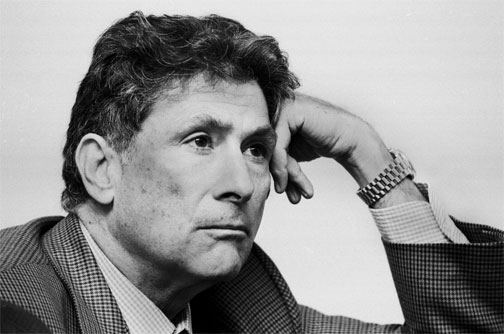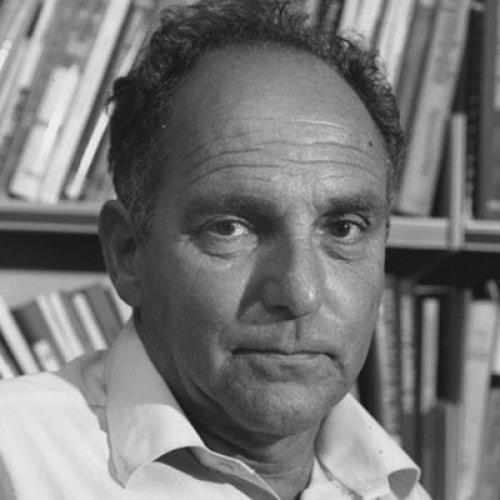Ernest Gellner and Edward Said

By Richard Marshall

Ernest Gellner and Edward Said whisper furiously as they pass each other by in opposite directions down endless corridors, strong ghosts scrawling crazed graffito on walls…
Edward Said: The intellectual is an individual endowed with a faculty for representing, embodying, articulating a message, a view, an attitude, philosophy or opinion to, as well as for, a public. And this role has an edge to it, and cannot be played without a sense of being someone whose place it is publicly to raise embarrassing questions, to confront orthodoxy and dogma (rather than to produce them), to be someone who cannot easily be co-opted by governments or corporations, and whose raison d’etre is to represent all those people and issues that are routinely forgotten or swept under the rug.
Ernest Gellner: Agreed, there are no privileged Sources or Affirmations, and all of them can be queried. In inquiry, all facts and all features are separable: it is always proper to inquire whether combinations could not be other than what had previously been supposed. In other words, the world does not arrive as a package-deal—which is the customary manner in which it appears in traditional cultures—but piecemeal. Strictly speaking, though it arrives as a package-deal, it is dismembered by thought.
ES: Yes. The more one is able to leave one’s cultural home, the more easily is one able to judge it, and the whole world as well, with the spiritual detachment and generosity necessary for true vision. The more easily, too, does one assess oneself and alien cultures with the same combination of intimacy and distance.
EG: Knowledge which… transcends the bounds, the prejudices and prejudgements of any one society and culture is not an illusion but, on the contrary, a glorious and luminous reality. Just how it was achieved remains subject to debate.
ES: What I am interested in doing now is suggesting how the general liberal consensus that “true” knowledge is fundamentally nonpolitical (and conversely, that overtly political knowledge is not “true” knowledge) obscures the highly if obscurely organized political circumstances obtaining when knowledge is produced. No one is helped in understanding this today when the adjective “political” is used as a label to discredit any work for daring to violate the protocol of pretended suprapolitical objectivity.
EG: When knowledge is the slave of social considerations, it defines a special class; when it serves its own ends only, it no longer does so. There is of course a profound logic in this paradox: genuine knowledge is egalitarian in that it allows no privileged source, testers, messengers of Truth. It tolerates no privileged and circumscribed data. The autonomy of knowledge is a leveller.
ES: Exile is strangely compelling to think about but terrible to experience. It is the unhealable rift forced between a human being and a native place, between the self and its true home: its essential sadness can never be surmounted. And while it is true that literature and history contain heroic, romantic, glorious, even triumphant episodes in an exile’s life, these are no more than efforts meant to overcome the crippling sorrow of estrangement. The achievements of exile are permanently undermined by the loss of something left behind forever.
EG: You talk to me of exile? I am deeply sensitive to the spell of nationalism. I can play about thirty Bohemian folk songs … on my mouth-organ. My oldest friend, who is Czech and a patriot, cannot bear to hear me play them because he says I do it in such a schmalzy way, ‘crying into the mouth organ’. I do not think I could have written the book on nationalism which I did write, were I not capable of crying, with the help of a little alcohol, over folk songs, which happen to be my favourite form of music.
ES: The secular world is the world of history as made by human beings. Human agency is subject to investigation and analysis, which it is the mission of understanding to apprehend, criticize, influence, and judge.. But for that kind of wider perception we need time and patient and skeptical inquiry, supported by faith in communities of interpretation that are difficult to sustain in a world demanding instant action and reaction. Humanism is the only, and I would go so far as to say, the final resistance we have against the inhuman practices and injustices that disfigure human history.
EG: People are reluctant to admit that man explains nothing, than they were to admit that God explains nothing. Civil Society is a cluster of institutions and associations strong enough to prevent tyranny, but which are, none the less, entered and left freely, rather than imposed by birth or sustained by awesome ritual. You can join the Labour Party without slaughtering a sheep…
ES: It would seem to be a vital necessity for independent intellectuals always to provide alternative models to the reductively simplifying and confining ones, based on mutual hostility, that have prevailed in the Middle East and elsewhere for so long.
EG: Just as every girl should have a husband, preferably her own, so every culture must have its state, preferably its own. It is nationalism which engenders nations, and not the other way round. In brief, nationalism is a theory of political legitimacy, which requires the ethnic boundaries should not be cut across political ones, and, in particular, that ethnic boundaries within a given state a contingency already formally excluded by the principle in its general formulation should not separate the power holders from the rest.
ES: The power to narrate, or to block other narratives from forming and emerging, is very important to culture and imperialism, and constitutes one of the main connections between them. Most important, the grand narratives of emancipation and enlightenment mobilized people in the colonial world to rise up and throw off imperial subjection; in the process, many Europeans and Americans were also stirred by these stories and their protagonists, and they too fought for new narratives of equality and human community. My basic point being that stories are at the heart of what explorers and novelists say about strange regions of the world; they also become the method colonized people use to assert their own identity and the existence of their own history.
EG: Maybe, but the viceroys of India were not known for eagerly scanning the pages of late-19th-century literary magazines. However, I do not recommend any legislative action against hermeneutics.
ES: The appropriation of history, the historicization of the past, the narrativization of society, all of which give the novel its force, include the accumulation and differentiation of social space, space to be used for social purposes.
EG: True. Nations as a natural, God-given way of classifying men, as an inherent though long-delayed political destiny, are a myth; nationalism, which sometimes takes pre-existing cultures and turns them into nations, sometimes invents them , and often obliterates pre-existing cultures: that is a reality, for better or worse, and in general an inescapable one. Those who are its historic agents know not what they do, but that is another matter. Thus, nationalism is the crystallisation of new cultures, not the awakening of old ones.
ES: To say simply that Orientalism was a rationalization of colonial rule is to ignore the extent to which colonial rule was justified in advance by Orientalism, rather than after the fact.
EG: Ok, but the reason we don’t have a global state is that industrialisation came unequally and the required critical masses are sufficient in current states.Cultures are package-deal worlds; scientific inquiry, by contrast, requires atomization of evidence. No linkages escape scrutiny. Empiricist theory of knowledge claimed that information actually arrives in tiny packages (which is false as a descriptive account); but the lesson learnt was that it should be treated as if it was so broken up. Such breaking up of clusters fosters critical revaluation of world-pictures.This reexamination of all associations destabilizes all cognitive anciens règimes. Moreover, the laws to which this world is subject are symmetrical. This levels out the world, and thereby ‘disenchants’ it, in the famous Weberian expression. This is the vision.
Note again, it desacralizes, disestablishes, disenchants everything substantive: no privileged facts, occasions, individuals, institutions or associations. In other words, no miracles, no divine interventions and conjuring performances and press conferences, no saviours, no sacred churches or sacramental communities. All hypotheses are subject to scrutiny, all facts open to novel interpretations, and all facts subject to symmetrical laws which preclude the miraculous, the sacred occasion, the intrusion of the Other into the Mundane.But what is perhaps absolutized and made exempt is the method itself. And the method leaves its shadow on the world: it engenders an orderly, symmetrical Nature. The orderliness of inquiry leaves its shadow, and appears as an orderly, unique nature.
This is the proper sense which is to be attributed to the Kantian doctrine that we ‘make’ our world: an orderly, systematic, law-bound Nature is really the shadow of our cognitive procedure.
ES: So what I'm saying is that Orientalism is not a mere political subject matter or field that is reflected passively by culture, scholarship, or institutions; nor is it a large and diffuse collection of texts about the Orient; nor is it representative and expressive of some nefarious “Western” imperialist plot to hold down the “Oriental” world. It is rather a distribution of geopolitical awareness into aesthetic, scholarly, economic, sociological, historical, and philological texts; it is an elaboration not only of a basic geographical distinction (the world is made up of two unequal halves, Orient and Occident) but also of a whole series of “interests” which, by such means as scholarly discovery, philological reconstruction, psychological analysis, landscape and sociological description, it not only creates but also maintains; it is, rather than expresses, a certain will or intention to understand, in some cases to control, manipulate, even to incorporate, what is a manifestly different (or alternative and novel) world; it is, above all, a discourse that is by no means in direct, corresponding relationship with political power in the raw, but rather is produced and exists in an uneven exchange with various kinds of power, shaped to a degree by the exchange with power political (as with a colonial or imperial establishment), power intellectual (as with reigning sciences like comparative linguistics or anatomy, or any of the modern policy sciences), power cultural (as with orthodoxies and canons of taste, texts, values), power moral (as with ideas about what “we” do and what “they” cannot do or understand as “we” do).
Indeed, my real argument is that Orientalism is—and does not simply represent—a considerable dimension of modern political-intellectual culture, and as such has less to do with the Orient than it does with “our” world.
EG: But take the Estonians. At the beginning of the nineteenth century they didn’t even have a name for themselves. They were just referred to as people who lived on the land as opposed to German or Swedish burghers and aristocrats and Russian administrators. They had no ethnonym. They were just a category without any ethnic self-consciousness. Since then they’ve been brilliantly successful in creating a vibrant culture. This is obviously very much alive in the Ethnographic Museum in Tartu, which has one object for every ten Estonians and there are only a million of them. (The Museum has a collection of 100,000 ethnographic objects). Estonian culture is obviously in no danger although they make a fuss about the Russian minority they’ve inherited from the Soviet system.
ES: Every single empire in its official discourse has said that it is not like all the others, that its circumstances are special, that it has a mission to enlighten, civilize, bring order and democracy, and that it uses force only as a last resort. And, sadder still, there always is a chorus of willing intellectuals to say calming words about benign or altruistic empires, as if one shouldn’t trust the evidence of one’s eyes watching the destruction and the misery and death brought by the latest mission civilizatrice. It is quite common to hear high officials in Washington and elsewhere speak of changing the map of the Middle East, as if ancient societies and myriad peoples can be shaken up like so many peanuts in a jar.
EG: Relativism does entail nihilism: if standards are inherently and inescapably expressions of something called culture, and can be nothing else, then no culture can be subjected to a standard, because (ex hypothesi) there cannot be a trans-cultural standard which would stand in judgement over it. No argument could be simpler or more conclusive. This mystique of consensual custom denies that anything can sit in judgment of our concepts, that some may be more rational and others less so. So all of them are in order and have nothing to fear from philosophy. This is a fairly mild form of irrationalism, invoking no fierce dark Gods, merely a consensual community. It is the Soft Porn of Irrationalism.
They rush away into shadows. There is the dark hum of war in the distance.


A version of this was first published at 3ammagazine in June 2016 in the 'Brexit Ghosts' series of imagined conversations.
At the Ernest Gellner symposium, virtual Prague, May 2021 Thomas Hylland Eriksen (University of Oslo) presented a paper - below is the abstract.
'Ernest Gellner made few friends among postcolonial scholars. This contribution examines his epistemology in relation to postcolonial studies, arguing that misunderstandings and other distortions prevented what could have been a fruitful dialogue. His view of knowledge, influenced to no small degree by Popper, can be made compatible with postcolonial studies, unlike what is the case with the later tendency of decolonial theory.
By comparing major statements by Gellner and Edward Said, I argue that postcolonialism seeks to refine and reformulate the principles laid out in his theoretical work, rather than rejecting them. The key questions concern the possibility of cumulative knowledge, the validity of rationalist ideals in interpretive scholarship, the role of ideas in history and, mainly, the potential of postcolonial scholarship in realising the Enlightenment ideals to which Gellner subscribed.'
The completed paper, plus all the other papers presented at the symposium, are being collected into a future volume.